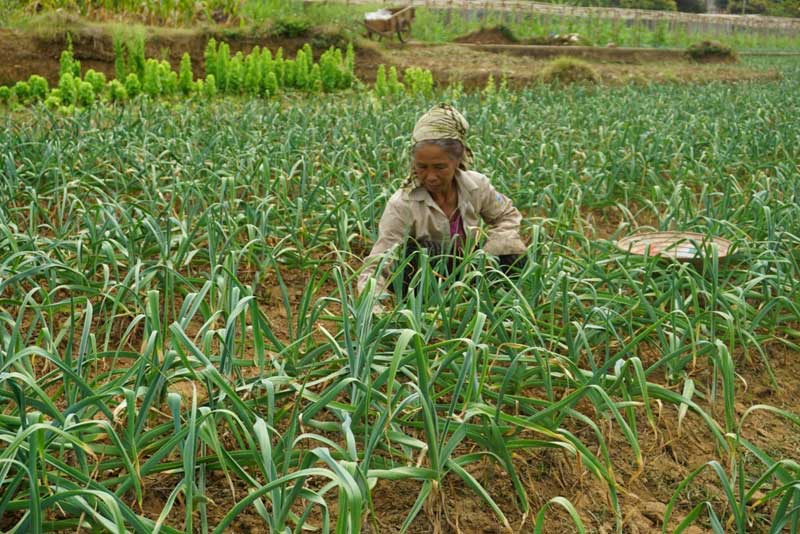
(HBO) – Building chain agricultural production models is a new way to help farmers sustainably improve products’ value. In particular, as Mai Chau district’s agricultural sector is on small scale, linkage is very necessary, especially manufacturing in value chain in tandem with branding. Under the chain agricultural development policy, Mai Chau district has carried out two projects on growing garlic and quash using funding from the national target programme on new rural development in Mai Hich commune since 2017.
Accordingly, participating
households received State support with 70 percent of seedlings and varieties, 5
percent of fertilisers, and training courses on plant growth periods. An automatic
irrigation system have been built to serve three hectares of safe vegetables in
Hai Son hamlet, 56 percent of the project’s cost will be sourced from the local
budget and the remaining for workforce was from farming households.
These are value chains linking
farmers with businesses which will be responsible for the supply of seedlings,
intensive farming guidance, pest control and consumption.

Farmers in Ngoa hamlet, Mai Hich
commune, Mai Chau district grow garlic in value chain to bring economic efficiency.
The Luong Phu cooperative has
signed a contract on the supply of materials (seedlings, chemical fertilisers,
pesticides) and a garlic and quash consumption contract with farming
households.
The Anh Tu Cao Phong clean
orange cooperative has sealed a contract on building an automatic watering
system for vegetables. The two cooperatives are competent enough to meet
requirements set forth in the projects.
The agricultural and forestry
encouragement stations built a technical process for garlic and squash farming
that suits local conditions and held training courses for farming households.
Economic efficiency for garlic is estimated at
22 tonnes of fresh garlic per ha, earning 330 million VND per hectare at a retail
price of 15,000 VND per kg for 330 million VND per ha. The cost is 164 million
VND per hectare while the profit tops 165 million VND per hectare. Quash yields
43 tonnes per hectare at a retail price of 4,000 VND per kg, earning 172
million VND per hectare. The cost surpasses 81 million VND per hectare and the
profit nears 90 million VND per hectare.
Dao Village’s honey – a product certified with a 3-star OCOP (One Commune One Product) rating by Thong Nhat Agricultural Cooperative in Dao Village (Hoa Binh City) – is highly regarded by consumers for its quality, richness, and variety in packaging. The distinctively sweet taste of Dao Village’s honey leaves a lasting impression on anyone who has tried it.
In alignment with Project No. 07-DA/TU, issued by the Hoa Binh provincial Party Committee on November 1, 2021, Lac Thuy district has actively promoted investment and supported the sustainable development of its industrial and handicraft sectors during the 2021–2025 period. Alongside this, the district has remained committed to preserving and revitalising traditional craft villages.
Located in the northern part of Lac Thuy district, with a temperate climate and fertile soil, Phu Thanh commune has great potential and advantages in growing tea. The long-standing experience, combined with strict adherence to organic farming practices in the tea gardens, ensures that the dried tea products from Phu Thanh and Lac Thuy as a whole are sold out immediately upon production, providing a stable and prosperous life for the local people.
Amid efforts to streamline the administrative apparatus, Hoa Binh province has intensified measures to address challenges in land clearance, resettlement support, and infrastructure investment, aiming to speed up the progress of key projects.
Hoa Binh province has posted an unprecedented economic growth rate of 12.76% in the first quarter of 2025, marking its highest quarterly performance to date and positioning it as the second fastest-growing locality in the country, trailing only Bac Giang province.
Under current regulations, products in the One Commune – One Product (OCOP) programme that are rated three stars or higher must undergo re-evaluation every three months. However, in reality, some of these products fail to consistently meet the required standards, raising concerns about the sustainability of their OCOP certification. This underscores the urgent need for producers to enhance product quality and gradually develop their OCOP products into strong, marketable brands.



